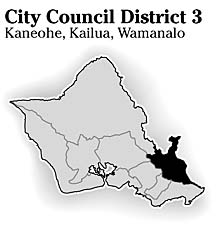


For the first time in decades, Kailua is incorporated into a single Honolulu City Council district. Quality of life
a Windward issue
Editor's note: This is eighth in a series of profiles about political candidates for the primary election Sept. 21.By Gordon Y.K. Pang
gpang@starbulletin.comThat may explain why three of the five candidates for the 3rd Council seat are from there.
Professional city planner Donald Bremner, radio executive Jeff Coelho and former television reporter Barbara Marshall, the three Kailua residents, are hoping the large number of Kailua residents will help them.
Former state Sen. Stan Koki, a Kaneohe resident, and Kimberly Kalama, a Waimanalo housewife, are hoping not.
All five are longtime Windward area residents and all five say that quality of life and preservation of the Windward lifestyle are important issues their constituents want to see addressed.
Bremner, 70, is perhaps best known as the longtime executive officer of the Waikiki Improvement Association. He also been involved with the Kailua Community Council and the Kailua Urban Design Task Force.
Bremner said among his top goals as a member of the Council would be "to protect and preserve the quality and character of our Windward living environment."
Bremner said he is a supporter of the Koolaupoko Sustainable Communities Plan that was approved in recent years to guide growth in the Windward area. "It's a matter of being vigilant and making sure it's followed," he said.
Among the hot-button issues for Coelho, 55, is "avoiding overcommercialization of Kailua Beach." Coelho believes there needs to be stricter regulation of commercial permits given to kayak, windsurfing, parasail and tour group operators there.
Ensuring beach access in the Windward neighborhoods is also a priority for the KUMU radio station general manager. "Anyone who wants to stroll to the beach should have access to the beach," he said.
Coelho, the founder of the Brown Bags to Stardom competition, said he decided to enter elected politics because of the need for "integrity, trust and confidence in government."
Kalama, 41, said that among her top priorities will be to emphasize cultural awareness on the Council, particularly the Hawaiian culture. "I believe people need to be more cultural-sensitive," she said. "Our resources lie within the Hawaiian culture."
Kalama's main district issue is property taxes. "We have been overtaxed, there's no doubt about it," she said. Property taxes in Waimanalo farm lots, where she lives, went up as much as 300 percent several years ago. While some challenged the assessments, she said, other families did not.
"Most of the families back here are on fixed income," she said. "And it's either they pay it or they lose it." Duplication of jobs and other unnecessary items that have made government inefficient can be eliminated, Kalama said.
Koki, 55, represented a large section of the Windward side in the state Senate from 1988 to 1994. He ran unsuccessfully for lieutenant governor as a Republican in 1994 and again in 1998 when he was Linda Lingle's running mate.
Koki, who manages personal investments, said there is a lack of city services being distributed to the Windward side of the island -- be it more maintenance workers for parks or additional police officers to combat the growing problem of drug-dealing.
Further, he said, "we want to maintain the current character of the Windward side -- no more large developments, no more big-box stores, no more residential development."
Marshall, 58, worked for KHON-TV News for more than two decades. Much of that time was as the consumer-oriented Action Line reporter. Lately, she has been in commercial real estate and is co-owner of Kama'aina Designs. Marshall has lived in Kailua since 1979.
Like Koki, Marshall believes quality of life is a big issue for Windward voters. "They love their communities and don't want major changes, but they do want improvements."
Different communities within the district have their own issues, Marshall said. "I want to make sure first that the money goes where it needs to go, then we'll see what kind of money we have to deal with some of these other problems in some kind of priority number."
State Office of Elections